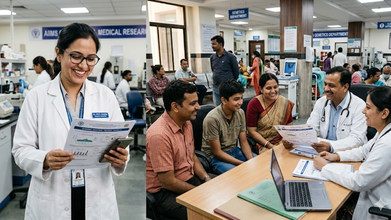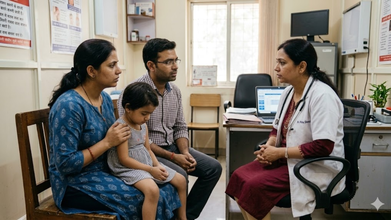- Health Conditions A-Z
- Health & Wellness
- Nutrition
- Fitness
- Health News
- Ayurveda
- Videos
- Medicine A-Z
- Parenting
8 Overlooked Signs Your Body Gives Before A Heart Attack

Image Credit: Canva
The main cause of death globally is still heart disease. Heart attacks may occur suddenly without any warning signs. However, in the film industry, intense chest pain would be portrayed for a heart attack. In actuality, many patients have slight symptoms that go unnoticed until the time of their heart attack days or even weeks prior to that.
Heart attacks do not always announce themselves with dramatic chest pain. Often, they manifest in subtle, easy-to-dismiss ways. Recognizing these overlooked warning signs and taking proactive steps toward cardiovascular health can save lives. If you or someone you know experiences any of these symptoms, seeking immediate medical care is crucial. Prioritizing heart health today can help prevent life-threatening complications in the future.
Warning Sings of A Heart Attack
1. Discomfort Pressure in the Chest
One of the earliest and most common warning signs of an impending heart attack is pressure, tightness, or fullness in the chest. This pain is not typically sharp and sudden, like most people associate with a heart attack, but it can be intermittent, coming in waves, and lasting for several minutes before fading away. According to the American Heart Association, this is one of the red flags when accompanied by exertion. If you have persistent chest pressure, you should call emergency services immediately.
2. Pain Radiating to Other Parts of the Body
The well-known symptom of chest pain can also manifest discomfort related to a heart attack as pain radiating to other parts of the body. It is not unusual for people experiencing this kind of heart attack to report feeling pain in the shoulders, arms, back, neck, and even jaw. The vagus nerve is one that connects the heart to the brain, abdomen, and neck. The pain may be referred to these regions. In case you experience a sudden, unexplained pain in these regions, especially when exercising, seek a doctor's opinion.
3. Dizziness and Lightheadedness
Feeling dizziness upon standing up quickly or missing a meal is common, but unexplained dizziness often with chest pain or shortness of breath is the first sign of heart attack. Sudden hypotension can seriously decrease the blood supply to the brain and cause dizziness. Dizziness that does not go away on its own should not be ignored.
4. Unexplained Fatigue
It often happens that excessive tiredness, particularly in a busy lifestyle, is considered trivial, but ongoing fatigue, mostly in women, is a predictor of heart failure. According to some studies, extreme fatigue often starts a month before a heart attack, primarily in women. This is simply because the heart cannot pump well enough, leaving insufficient oxygen available to muscles and organs. Consult a healthcare professional if you become increasingly tired over time, yet are getting all the rest in the world.
5. Nausea, Indigestion, or Stomach Pain
Digestive problems like nausea, vomiting, or indigestion are often mistaken for acid reflux or food poisoning. However, these symptoms can also indicate reduced blood flow to the digestive tract, a common precursor to heart attacks. If you experience gastrointestinal distress alongside other symptoms like dizziness or chest discomfort, it's important to seek medical advice immediately.
6. Cold Sweats and Excessive Perspiration
Without apparent reason, a heart attack might be signaled by sudden sweating without any exercise or hot weather conditions. The heart's inability to function properly creates the body's "fight or flight" reaction, which means excessive sweating will occur. Be aware of your body and never ignore a cold sweat, particularly if it coincides with other symptoms.
7. Heart palpitations or irregular heartbeat
A racing or irregular heartbeat can be a normal reaction to stress or caffeine consumption. However, regular or unprovoked heart palpitations may indicate that the heart is under duress. If the heart is not getting enough oxygen-rich blood, it can start to beat irregularly. If you experience palpitations along with dizziness, chest pain, or shortness of breath, you should see a doctor right away.
8. Shortness of Breath
If suddenly climbing stairs or performing other everyday activities becomes a problem, then there may be a heart issue. Shortness of breath usually occurs with heart conditions because the circulation is not adequate and less oxygen is provided to the lungs. This symptom can occur either with or without chest pain and is an important indicator of the presence of underlying heart disease. If you find yourself experiencing sudden unexplained breathlessness, then seek a healthcare provider as soon as possible.
When to Seek Medical Attention
Early detection of these symptoms and early intervention can help avoid a life-threatening heart attack. You should visit a doctor if you feel the following symptoms:
- Symptoms induced by exertion and relieved by rest
- The simultaneous onset of several warning signs, including weakness, dizziness, and nausea
- Personal or family history of heart disease, hypertension, diabetes, or smoking
Preventing Heart Attacks: Proactive Steps for Heart Health
Although heart attacks may come out of nowhere, lifestyle plays an important role in reducing a patient's risk; here are some heart-healthy habits to consider:
Take on a Heart-Healthy Diet: Focus on consuming whole foods, lean proteins, healthy fats, and fiber-rich fruits and vegetables. Try to limit processed foods, saturated fats, and added sugars.
Stay Active: Engage in at least 30 minutes of moderate physical activity most days of the week to strengthen your heart and improve blood circulation.
Smoking. Smoking is probably the single largest risk factor for heart disease. If you are a smoker, quitting can easily be the single best thing you can do to improve your heart health.
Deal with Stress: Chronic stress leads to heart disease. Relaxed people through various relaxation techniques including yoga, meditation, and even deep breathing, have lesser stresses.
Regular health checks Monitor blood pressure, cholesterol levels, and blood sugar on a regular basis. The risk factors' early detection can help avoid serious complications.
US Signs 24 Health MoUs Under ‘America First’ Strategy, More Details Inside

Credits: Wikimedia Commons
The United States has signed 24 bilateral health Memoranda of Understanding or MoUs with Latin America and African countries under the Trump administration's America First Global Health Strategy.
The first agreement with Panama is described as “strengthening Western hemisphere health security”, which it added is “a priority”. Thereafter, four Latin American agreements too involve smaller grants and focus on disease surveillance. Other 20 agreements all with African countries who have been previous recipients of health grants via the now disbanded US agency for International Development or USAID and decimated US President's Emergency Funds for AIDS Relief (PEPFAR).
The five-year MoUs aim to quickly shift financial responsibility for key health services to national governments. In several countries, including Kenya, Uganda and the Democratic Republic of Congo (DRC), more than half of HIV programme funding has traditionally come from donors, particularly the United States. In the DRC, for instance, at least half of the antiretroviral medicines used have been financed by the US.
What Do These MoUs Comprise?
The transitional Memorandums of Understanding (MoUs) signed between the United States and several countries come with a major condition. They require strong investment in infectious disease surveillance systems.
The goal is to ensure that pathogen information from outbreaks is shared with the US within a week. Officials say this helps detect global threats early and protect public health.
At the same time, it gives US pharmaceutical companies early access to pathogen data, allowing them to develop vaccines, medicines and diagnostics more quickly.
The US–DRC Health Agreement
The United States and the Democratic Republic of Congo (DRC) signed their health MoU on 26 February. According to the US State Department, the agreement focuses on strengthening the country’s ability to detect and contain infectious disease outbreaks before they spread internationally.
- The focus reflects the country’s recent health challenges.
- The DRC has experienced several Ebola outbreaks in recent years.
- It is also dealing with the world’s largest mpox outbreak.
Funding Commitments
Under the agreement:
- The US will invest up to $900 million over five years
- The DRC will increase its health spending by $300 million
Most of the funding will support a national integrated surveillance and outbreak response system.
This includes:
- A laboratory network capable of detecting outbreaks within seven days
- Faster outbreak investigations and response systems
- Coordination between the US and other global health partners
The MoU also aims to modernize health data systems through electronic medical records, interoperable platforms, better trained community health workers and expanded services for HIV, tuberculosis, malaria, polio and maternal and child health.
Minerals Before Health
In several cases, health agreements were preceded by deals related to natural resources.
The United States and the DRC first signed a strategic partnership on critical minerals. The deal aims to secure supplies of minerals needed for commercial and defense industries.
The DRC is one of the world’s largest sources of rare earth minerals, including cobalt and copper. China has historically dominated the purchasing and processing of these resources.
Recently, the DRC has begun opening its mineral sector to US investors. According to Reuters, the government sent Washington a shortlist of state owned assets involving:
- manganese
- copper
- cobalt
- gold
- lithium
Guinea followed a similar path. It signed a minerals MoU with the US on 5 February, followed by a health MoU on 27 February. The health agreement prioritizes strengthening laboratory networks and improving biosafety standards by 2027.
Legal Pushback and Rejected Deals
Not all countries are comfortable linking health support to access to resources or data.
In the DRC, a group of lawyers has challenged the minerals agreement in the Constitutional Court. They argue that the deal violates the constitution and undermines national sovereignty over natural resources.
Zimbabwe also withdrew from negotiations with the US over a similar agreement.
Officials said the country was asked to share biological resources and outbreak data for years without any guarantee that vaccines, treatments or diagnostics developed from that data would be available to Zimbabwe if a future crisis occurred. They also said the US did not offer reciprocal sharing of its own epidemiological data.
Concerns in Kenya and Zambia
Kenya’s agreement with the United States has also faced legal hurdles. The country’s High Court halted the MoU after two court challenges questioned provisions that could allow the US access to patient data and pathogen information.
Zambia has also expressed reservations about its proposed health deal with Washington. The agreement stalled after the US linked the billion dollar package to cooperation in the country’s mining sector, particularly copper and cobalt.
Zambia has since asked for revisions, saying parts of the deal do not align with its national interests.
Critics Call the Policy “Extractive”
Some experts argue that these agreements reflect a broader shift in US global health policy.
Sophie Harman, professor of international politics at Queen Mary University of London, wrote in the BMJ that extraction appears to be central to the approach.
According to her analysis, the policy focuses less on improving global health outcomes and more on strengthening US economic and geopolitical interests, including competition with China.
She warns that countries entering such agreements could risk giving up resources or scientific data while gaining relatively limited health benefits.
Digital Health and Telemedicine: Expanding Access to Rare Disease Care

(AI Generated)
Rare diseases may be individually uncommon, but together they represent a large and persistent care gap. More than 300 million people globally live with a rare condition, and when families and caregivers are counted, the impact touches over one billion lives. The economic burden is estimated to exceed $7 trillion each year.
In India, the challenge is compounded by geography, uneven specialist availability and the lifelong nature of many rare conditions. The question is no longer whether the system recognises the need, but whether it can deliver continuous care at scale.
Why Patients Still Struggle To Reach Care
For most rare disease patients, the hardest part is not always the science but the pathway to care. Diagnosis is often delayed, sometimes by years. Patients move between providers carrying incomplete records. Specialist centres are concentrated in a few large cities, forcing families to travel repeatedly for consultations that may last only minutes. This is both financially draining and clinically inefficient.
Telemedicine is beginning to ease some of this pressure. Virtual consultations allow specialists to extend their reach beyond metropolitan clusters. For families in tier two and tier three locations, this can mean earlier clinical input and fewer avoidable journeys.
Remote monitoring tools are also shifting care from episodic hospital visits to continuous oversight, which is particularly valuable for conditions that require close tracking over time.
Why Data Matters More Than Ever
If access is the visible challenge, data fragmentation is the structural one. Rare disease information remains scattered across hospitals, laboratories and individual case files. This weak visibility affects everything from prevalence estimates to therapy development. Policymakers struggle to size the problem accurately. Clinicians miss longitudinal patterns. Industry investment becomes harder to justify.
Digital health systems can address this by creating longitudinal patient records that follow individuals across providers. Even relatively modest steps such as strengthening diagnostic reporting or building disease registries can significantly improve coordination. For rare diseases, where patient numbers are small and widely dispersed, structured data is not a luxury. It is the backbone of effective care.
India’s Digital Opportunity
India has begun building the rails needed for this transition. The Ayushman Bharat Digital Mission is creating a national health data architecture anchored in unique health IDs and interoperable records. If applied rigorously to rare diseases, this infrastructure can support lifelong patient tracking, improve referral accuracy and give policymakers clearer visibility into disease burden.
Interoperability will determine how far this effort goes. The growing adoption of FHIR standards and API led systems is slowly allowing previously disconnected hospital platforms to exchange clinical information. For rare disease patients, whose care often spans multiple providers and years of follow up, this continuity is not technical detail. It is essential to safe treatment.
AI Moves From Promise To Practice
Artificial intelligence is also starting to show practical value. Globally, AI based clinical decision support tools are being used to flag potential rare disease cases hidden within routine health records. This matters because many rare conditions present with non specific symptoms and are frequently missed in early stages.
Collaborations between technology firms and pharmaceutical companies are demonstrating how electronic health record analysis, suspect patient lists and longitudinal data can help clinicians triage cases earlier for confirmatory testing. As these tools mature and integrate into routine workflows, they could significantly shorten the diagnostic odyssey that rare disease families currently endure.
Engaging Patients Beyond The Clinic
At the patient level, the shift is becoming more practical and visible. Tools that let people log symptoms, get medication reminders and share updates in real time are helping them stay more consistent with treatment, while giving clinicians better insight between visits. For lifelong conditions, this kind of day to day support brings care into the flow of everyday life, where most disease management actually happens.
Federated data models add an important layer of trust. By enabling analysis across multiple small patient populations without moving sensitive personal data, they address both privacy concerns and the sample size limitations that have historically slowed rare disease research.
From Pilots to Systems
Progress is visible across both public and private sectors. Regulated digital health platforms are already supporting rare disease programmes in several countries. Industry collaborations are using AI to detect conditions that often go undiagnosed for years. Public genomic databases are generating new diagnoses by enabling experts to build on shared evidence.
India’s immediate task is to move beyond isolated pilots. Telemedicine networks must be tied to referral protocols and reimbursement pathways. Digital registries must be built with strong governance and patient trust. AI tools need to be embedded into everyday clinical workflows rather than remaining demonstration projects.
Why Investment Makes Fiscal Sense
Poorly managed rare diseases create avoidable hospitalisations, lost productivity and long term care costs. Evidence increasingly shows that targeted investments in data systems, screening and coordinated care can reduce downstream expenditure. For low- and middle-income countries working within tight health budgets, these are not marginal gains.
India already has many of the building blocks needed to improve rare disease care, from expanding digital health infrastructure to growing AI capabilities and increasing policy focus. The real test now is disciplined execution.
Telemedicine networks must deepen their reach, patient registries need to become reliable and usable, data must move securely across systems, and clinicians should have decision support tools that fit into everyday practice. Taken together, these steps can meaningfully narrow today’s access gaps.
Digital health will not make rare diseases any less complex. But if implemented thoughtfully, it can reduce distance, shorten delays and bring much needed continuity to care journeys that are currently fragmented. For families managing lifelong conditions, that would be a tangible and much overdue shift.
When Symptoms Don’t Add Up: How Hidden Genetic Conditions Go Undetected for Years

(AI Generated)
In India, it is not uncommon for families to travel across cities, sometimes across states, seeking answers for symptoms that simply don’t make sense. A child who is not meeting developmental milestones. A young adult with unexplained muscle weakness. Recurrent hospital visits with no clear diagnosis.
For many, this long and frustrating search for clarity is what medicine calls the diagnostic odyssey.
Rare diseases are individually uncommon, but collectively they affect millions of people worldwide. Rare diseases affect an estimated 263–446 million people worldwide, spanning every geography, healthcare system, and socioeconomic context. India alone is estimated to have 70 million people living with rare diseases.
Importantly, although 70%–80% of rare diseases are genetic in origin, routine medical practices often consider genetic testing only after years of inconclusive evaluations.
In India, this challenge is amplified by several factors, including limited awareness of rare conditions, uneven access to specialized testing across regions, and a tendency to treat symptoms individually rather than look for a unifying cause.
A child may see a neurologist for seizures, a gastroenterologist for feeding issues, and a developmental pediatrician for delays, without anyone connecting the dots.
Studies have shown that patients and their families frequently wait years before receiving a confirmed diagnosis. Globally, rare disease diagnosis can take anywhere between 5–30 years.
In a country like India, where healthcare expenses are often paid out-of-pocket, this prolonged uncertainty can be devastating. Beyond cost, there is the psychological toll; parents wondering if they missed something and adult patients often questioning whether their symptoms are “all in their head”. During this period, families undergo repeated tests, face conflicting opinions, and bear significant emotional and financial strains.
Research shows that families experience profound emotional burden during the diagnostic odyssey, including stress, anxiety, and feelings of isolation.
Why Do These Conditions Stay Undetected For Years?
In many cases, the explanation is written into a person’s DNA. Genetic disorders rarely announce themselves clearly; instead, they often mimic common illnesses. Fatigue may look like anemia, developmental delay may resemble a learning difficulty, and repeated infections might be treated as isolated events rather than part of a larger pattern. Because the symptoms overlap with more familiar conditions, doctors naturally begin by treating what appears most likely.
Most healthcare systems also follow a step-by-step diagnostic approach; rule out the common causes first, then move to less common ones if symptoms persist. While this method works well for typical illnesses, it can significantly delay answers for rare genetic conditions. Without looking directly at the genetic blueprint, the underlying cause may remain hidden, even as the visible symptoms are managed one at a time.
Today, advances in genomic technologies such as whole-exome sequencing (WES) and whole-genome sequencing (WGS) allow us to examine thousands of genes simultaneously. Rather than guessing which gene might be responsible, we can comprehensively analyze a patient’s DNA to search for answers.
Evidence increasingly supports the use of genomic sequencing earlier in the diagnosis and care of rare diseases. Similarly, studies highlight how genomic testing not only provides diagnoses but also directly influences treatment decisions and long-term care planning.
In the Indian context, integrating genetic testing earlier could transform care. Instead of years of fragmented consultations, patients could receive a precise diagnosis sooner. This clarity can:
- Prevent unnecessary or repeated investigations
- Guide appropriate treatment strategies
- Inform family members about potential risks
- Enable informed decisions about future pregnancies
- Equally important, it replaces uncertainty with understanding.
Encouragingly, awareness around rare diseases is growing in India, and conversations around early genomic testing are becoming more mainstream. As technology becomes more affordable and accessible, we have an opportunity to fundamentally change the patient journey.
No family should spend years searching for answers when science has the tools to help. By embracing genomic medicine earlier in the diagnostic pathway, we can shorten the odyssey, reduce suffering, and empower families with clarity.
Because when symptoms don’t add up, sometimes the answer lies written in our genes.
© 2024 Bennett, Coleman & Company Limited

